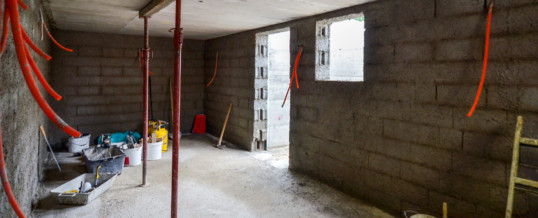
In the United States, floods are the number one natural disaster. Many basements become waterlogged as a result, and homeowners spend anywhere between $500 to $10,000 to fix it. If the damage is significant, you may spend up to $50,000 to remedy it!
But if you take the proper steps to waterproof your basement, you won’t have to deal with such a hassle and drain on your wallet. Think of these precautions as an investment in your future.
Here are 6 do’s and don’ts of waterproofing a basement so come flood season, your home will stay nice and dry.
1. Do Regularly Clean Your Gutters
Wait a second, isn’t this article about basements?
Well, yes. But what a lot of people don’t know is if their gutters aren’t regularly cleaned and it gets backed up with debris, your gutters won’t be able to do their job.
Instead of redirecting the rainwater into their pipes, they’ll overflow. That water will then end up in your basement!
So do yourself a favor and make sure your gutters are always free of leaves and other debris. While this may take a little extra work on your part, this will make waterproofing your basement so much easier, especially for flood season.
2. Do Fix Your Downspout
Not only do you need to make sure your gutters are always clear, but you should also have your downspouts fixed and/or repositioned if they’re currently splattering water all over your foundation.
The thing is, the main purpose of downspouts is to position water away from your home’s foundation, not toward!
Your downspouts should’ve been installed at a correct angle. But that can change over time.
The next time it rains, take a look at where the water’s going from your downspouts. If you notice any going toward your foundation, then you need to have someone fix that straight away.
3. Don’t Ignore Leaks
Perhaps you’ve noticed some moisture in your basement. It’s easy to feel anxious about it.
You may want to ignore the dampness, and you might think to yourself: Maybe this is a one-off thing and I don’t really have a leaky basement. It’ll go away on its own.
But the reality is, if there’s water coming into your basement, there will be several consequences. First of all, you’ll get mold growth, which is detrimental to your health. Second of all, there may be structural damage to your home’s foundation.
If you ignore either issue, it can grow into something so massive it’ll take lots of time and money to fix. So don’t stick your head in the sand; if you notice a leak, find the source and get it remedied immediately.
4. Don’t Use Do-It-Yourself Sealants
We all like to save money where we can, but this is something you shouldn’t skimp on.
When you have a leak, you probably head over to the home improvement store to look for something you can apply yourself to fix it. While many products claim to be the best on the market and will waterproof like magic, the truth is, they won’t. Or they might temporarily fix the leak, but soon enough, it’ll come back.
For those DIY sealants, it’s best if you treat them as just temporary solutions to a leaking basement. If you can get your hands on it, you should use hydraulic cement to fill any cracks in your basement walls.
Hydraulic cement will expand and form watertight bonds in the cracks, which will prevent water from getting inside your basement.
5. Do Thorough Cleaning After Flooding
Maybe your basement wasn’t quite as waterproofed as you thought, and now, it’s flooded from a recent storm. You might have to call insurance, plus deal with everyday life. You don’t have time to clean out your basement after flooding, so you may try and postpone it.
But every second that goes by, you’re letting your basement become more susceptible to mold and damage. The best thing you can do right after flooding is to thoroughly clean it out.
Remove everything that’s in the basement and give it a good scrub with bleach or any other household cleaner that kills mold. Anything that’s been soaked should be left out to dry as much as possible.
The sooner you can do this, the better. Considering small amounts of mold spores won’t be visible to the naked eye, it’s better to tackle this problem before it grows rapidly.
6. Do Call a Professional
Lastly, to ensure your basement is completely waterproofed, you should call in the experts to perform professional waterproofing. Because they have the skills and knowledge of the industry, you can get complete peace of mind knowing that no matter how big any future storms are, your basement won’t get waterlogged.
The immediate benefit of calling a professional is they can perform a thorough inspection of your property. This means if there are any small cracks where water can get through, you can bet they’ll find it.
You’ll also enjoy a wide range of waterproofing services, such as the proprietary waterproofing methods on window drains, stairwell drains, and reinforced wall liners.
For instance, unlike with archaic systems, the Armored Basement Waterproofing System doesn’t have any gaps in it. This ensures that no water will run down your walls and will get redirected to the sump pump immediately.
Waterproofing a Basement Is a Cinch
Waterproofing a basement doesn’t have to be difficult, especially if you have a professional on your side. If you make sure to follow our do’s and don’ts, then you’ll have an easy time waterproofing your basement so it stays nice and dry for years to come.
If you’re ready to get your basement waterproofed before flood season, then get in touch with us now. We’ll give your home a free inspection!
ShareDEC
